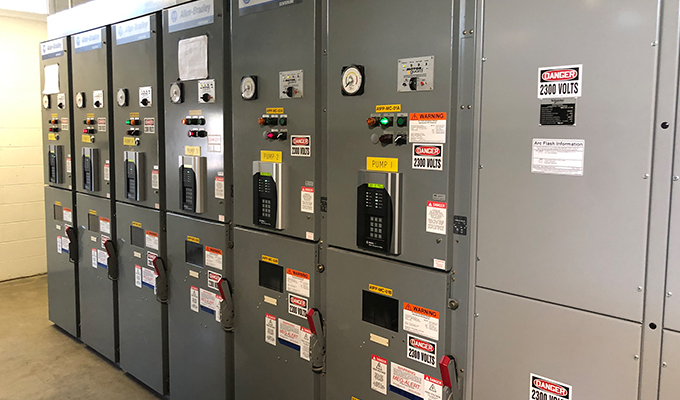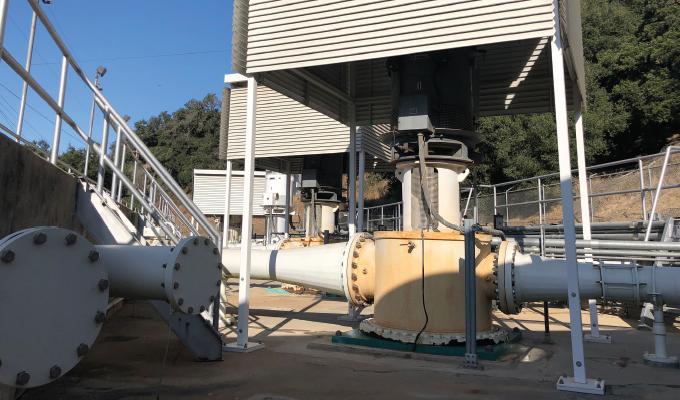By Jeff Elliott
Although municipal and industrial process engineers have streamlined the monitoring and control of critical equipment through SCADA systems and other means of online connectivity, the testing of insulation resistance in critical pump motors is one area that is still largely dependent on physical, hands-on monitoring—also known as “megging.”
For decades, facility electrical engineers have performed insulation resistance tests with handheld megohmmeters. However, these tests only provide a “snapshot” of motor health. In a matter of only a few days, motor windings and cables that are exposed to moisture, chemicals, contaminants or vibration can become compromised and fail at startup.
This is even more problematic when tens or hundreds of critical pump motors are located in remote areas—or even spread across a massive, multi-acre facility. The technical staff often does not have the time or resources to routinely check individual critical motors to see if each is in good working order.
Fortunately, megohmmeter testing is now available in automated version where units are installed on critical pump motors to continuously and automatically test insulation resistance while the motor is de-energized.
If a low resistance is found, the system automatically alerts plant personnel by text, email or other notification. Just as important, if the megohmmeter readings are too low, the system is designed to prevent the pump motor from starting.
By doing so, technicians can be confident that critical pump motors are protected. This can prevent catastrophic motor failures on startup, reduce unscheduled downtime and save on major rewinding repairs that can cost $150,000 for some larger motors.

STREAMLINING CRITICAL PUMP MOTOR MONITORING
As an electrical instrumentation technician for a local public water authority in North Carolina, Steven Jones and a small technical staff are responsible for maintaining hundreds of sites across an approximately 30-square-mile area. On the wastewater service side alone, approximately 100 sites depend on submersible pumps, according to Jones.
“You can imagine the amount of work that four people have maintaining about 200 sites for pretty much anything electrical,” says Jones, who notes that critical pumps up to 250 horsepower are essential for pumping wastewater in this process.
To more effectively monitor and protect such pump motors, the public water authority relies on a continuous testing and monitoring device called Meg-Alert that can automatically text and email technicians if a motor test results in a low insulation resistance reading. In such a case, the unit will prevent the motor from starting until it can be checked and repaired.
The testing device is permanently installed inside the high voltage compartment of the MCC or switchgear and directly connects to the motor or generator windings. The unit senses when the motor or generator is offline and then performs a continuous dielectric insulation resistance test on the winding insulation until the equipment is re-started.
The unit functions by applying a non-destructive, current limited, DC test voltage to the phase windings and then safely measures any leakage current through the insulation back to ground. The system uses DC test voltage levels of 500; 1,000; 2,500; or 5,000 volts that meet the IEEE, ABS, ANSI/NETA, and ASTM International standards for proper testing voltage based on the operating voltage of the equipment.
“Every submersible motor that we have in the wastewater system has a Meg-Alert on the pump,” says Jones. “The device checks the pump motor 24/7 when the motor is not running. It assures us when the pump is good and alerts us when there is an issue.”
According to Jones, personnel no longer having to drive from location to location to manually check units is one of the greatest benefits of the automatic notifications Meg-Alert triggers through their SCADA system. “It saves a lot of time when a technician does not have to drive to a pump, shut it down, then disconnect and ‘meg’ it to check its condition,” says Jones.
Jones says the Meg-Alert unit is set up so that a failed test result will prevent the pump from running until personnel can figure out the best resolution.
“If there is an issue with the pump, it prevents further damage until the pump can be checked. So, we can determine if we can continue to run it or if it needs to be pulled out of service,” he says.
He adds, “If it shows a low resistance reading and everything else in the pump motor looks good, we can have the motor windings reinsulated at a cost of $2,000 to $3,000 instead of spending $10,000 to $15,000 for a complete rebuild if damage occurs.”
According to Jones, however, too many in the water and wastewater industry are still unaware of automatic meggers. Without the time or manpower to routinely megger equipment, he says that too many essentially wait for pump motors to fail, then repair or replace them.
“The automatic devices are worth every penny we spend on them,” adds Jones.

CONTINUOUS TESTING REDUCES REPAIR AND REPLACEMENT
For the Casitas Municipal Water District in California, the split case pumps used to drive large GE horizontal 2300 V motors are an essential part of supplying water to approximately 70,000 people in Western Ventura County and to hundreds of farms. In addition, the district operates the Lake Casitas Recreation Area, which has become a popular destination with over 750,000 visitors each year.
“We pump water out of Lake Casitas to a treatment plant, where it goes through a treatment process, and then on to a number of pump plants to reservoirs along the way,” says Tracy Medeiros, a Casitas Municipal Water District electrical mechanical technician, who notes that the critical motors required to pump the district’s water typically range from 300 to 1,250 horsepower.
According to Medeiros, one pump plant is next to a horse corral in a dusty environment, and having sites near the coast can lead to damp conditions as well. So, in order to avoid dusty motor windings or motor dampness that could potentially cause an electrical short or other serious problem, frequent megohmmeter testing of such motors is vitally important.
“If we notice our meg readings go way down due to dampness, for instance, we will keep the units shut down and dry them out with heaters,” says Medeiros. “But if a critical motor goes down and we can’t pump water in one of our main pump plants, we are in big trouble.”
When a critical motor fails, Medeiros says it usually costs about $50,000 for a repair that involves taking out the impurities, rewinding the windings and then vacuum sealing them. However, he notes that replacing the windings can cost considerably more.
As a solution, the Casitas Municipal Water District has relied on the Meg-Alert continuous testing and monitoring device in a number of pump plants.
“If there is a problem with the motor windings like too much moisture, the Meg-Alert equipment will alarm, lock the unit and prevent the motor from failing on start up so we can investigate the problem,” he says. “If the meg reading is low on a long-term basis, we can proactively get PM done to correct the problem before it becomes serious.”
FOR MORE INFORMATION
With over three decades of experience in the process control instruments industry, customers count on Meg-Alert to provide them with the high-quality products and excellent service customers have come to expect. These qualities, along with a spirit of innovation and unparalleled customer understanding, combine to give customers the best possible solution and experience for their business. Meg-Alert devices ensure not only the safety of personnel, but also the reliability they need from their motors and generators. For more information, call 800.778.5689 or visit www.megalert.com.
MODERN PUMPING TODAY, November 2019
Did you enjoy this article?
Subscribe to the FREE Digital Edition of Modern Pumping Today Magazine!



